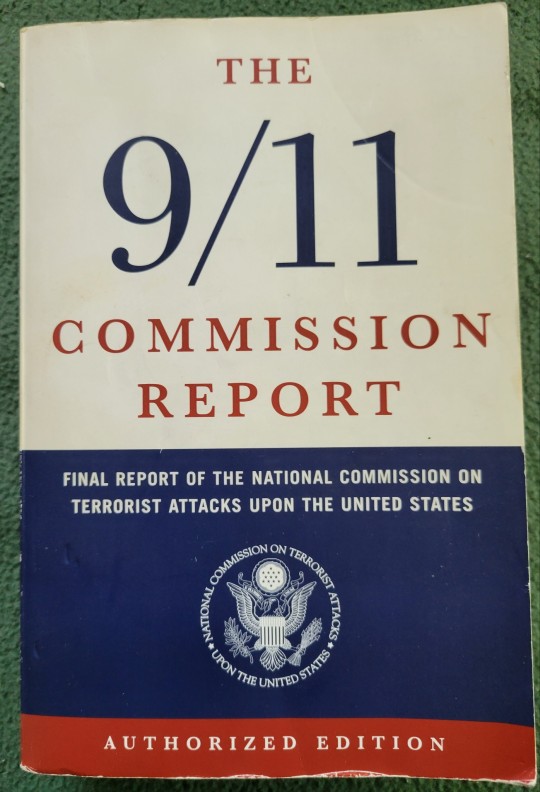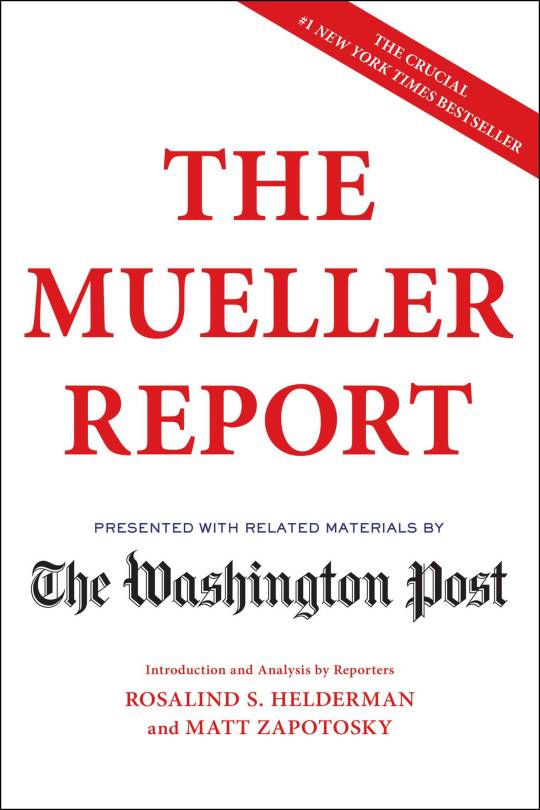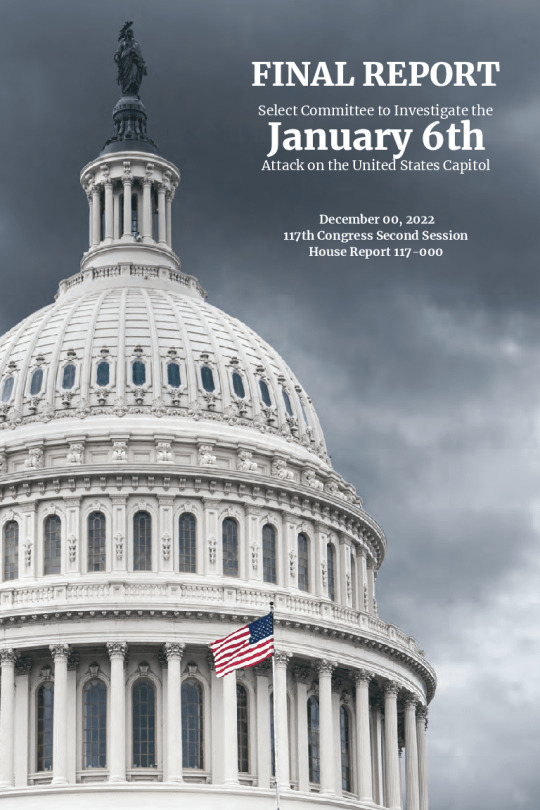#Mueller report
Text
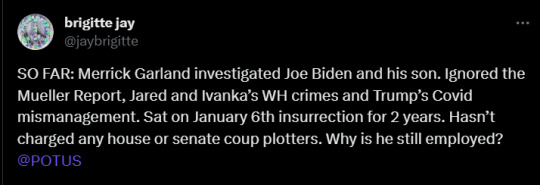
32 notes
·
View notes
Video
Snippet of Alfred Molina’s participation in reading the Mueller report at the Odyssey Theatre Ensemble. Full video can be viewed here:
MuellerReportLA Live Reading
155 notes
·
View notes
Text
Yevgeny Prigozhin, the head of Russia's Wagner mercenary group, said on Tuesday that he founded and financed and the Internet Research Agency, a company Washington says is a "troll farm" which meddled in the 2016 U.S. presidential election.
Prigozhin, an ally of Russian President Vladimir Putin, spent years operating on behalf of the Kremlin in the shadows, but has emerged in recent months as one of the most high profile figures connected with Russia's invasion of Ukraine.
He has previously admitted interfering in U.S. elections, but his statement on Tuesday appears to go further than before in outlining his specific links to the St. Petersburg-based Internet Research Agency (IRA).
"I was never just the financier of the Internet Research Agency. I thought it up, I created it, I managed it for a long time," Prigozhin said in a post shared on social media by the press service of his Concord catering group.
"It was created to protect the Russian information space from the West's boorish and aggressive anti-Russian propaganda," Prigozhin said.
Prigozhin was first sanctioned by the United States over his links to the Internet Research Agency in 2018 and charged with conspiracy to defraud the United States.
Special Counsel Robert Mueller’s report on his inquiry into Russia’s role in the 2016 U.S. election said that Internet Research Agency sought to sow discord in the United States through "information warfare."
It sought to sway the 2016 election in favour of Trump, Mueller’s report said.
"The campaign evolved from a generalized program designed in 2014 and 2015 to undermine the U.S. electoral system, to a targeted operation that by early 2016 favored candidate Trump and disparaged candidate [Hillary] Clinton," the report said.
"IRA employees also traveled to the United States on intelligence-gathering missions."
Prigozhin, who spent the final decade of the Soviet Union in prison for robbery and fraud, was for years an associate of Putin. His catering group swept up government contracts, earning him the nickname of "Putin's Chef", while he deployed Wagner mercenaries to fight alongside Russian servicemen in Syria and to conflicts across Africa to advance Russia's geopolitical interests.
After years of denials, he last year admitted his links to Wagner and said he had interfered in U.S. elections.
Having rapidly built his public profile both in Russia and abroad since Russia invaded Ukraine, analysts say the Kremlin has moved to clip his wings more recently, concerned about the outspoken businessman's growing stature and high-profile criticism of the defence ministry.
#us politics#news#reuters#russia#ukraine#ukrainian crisis#Yevgeny Prigozhin#wagner group#Internet Research Agency#2016 election#2023#election interference#Kremlin#vladimir putin#robert mueller#mueller report
31 notes
·
View notes
Text
This article is from 2019 and never more important than now. Maybe people didn't take it seriously then. I hope they will, now.
"Shortly after World War II, when Europe lay in ruin and humanity was newly traumatized by the spectacle of organized violence that an authoritarian regime could achieve in the industrial epoch, the Western World experienced a sudden cultural shift. This new regime of thought is sometimes called postmodernism, but that term is obscure and overused; a better way to think about this is that there was no longer a unifying narrative, a guiding thread that united humans in the West. Whereas some countries might have previously had religious bonds, or ethnic bonds, or monarchial bonds, or even political bonds around, say, an authoritarian leader, suddenly there were none anymore — or at least none that were universally believed. Individualism and identity were more important, and politicians and legal bodies would now have to consider how to govern subjects in an ambiguous, pluralistic, multicultural world.
At the same time, it was becoming clear that the forces that shaped the world — the power to organize society, or to exterminate it — were in the hands of scientists and technologists. The atom bomb, the intercontinental ballistic missile, the radio, the car, electrification, the refrigerator and the moon landing all happened in a span of about a hundred years. Science and technology spurred World War II, and led to its conclusion. And as the war receded from memory, it was apparent that the areas of greatest economic growth were all in technical fields — computers, engineering, communications, biotech and material science.
Jean-Francois Lyotard, a French philosopher who studied the condition of knowledge in this new era, realized that technology had changed the way that humans even thought about what knowledge was. Knowledge that computers could not process or manage — for instance, the ability to think critically or analyze qualitatively — was increasingly devalued, while the kinds of knowledge that computers could process became more important. As Lyotard wrote:
The miniaturisation and commercialisation of machines is already changing the way in which learning is acquired, classified, made available, and exploited....The nature of knowledge cannot survive unchanged within this context of general transformation. It can fit into the new channels, and become operational, only if learning is translated into quantities of information. We can predict that anything in the constituted body of knowledge that is not translatable in this way will be abandoned... Along with the hegemony of computers comes a certain logic, and therefore a certain set of prescriptions determining which statements are accepted as “knowledge” statements.
Lyotard wrote this in 1978, before the modern internet even existed. Today, the idea that computational forms of knowledge — and/or the kinds of people who traffic in that knowledge — are more valuable to our society seems to be universal. Thanks to generous grants from the tech industry and well-heeled nonprofits like the Mellon Foundation, humanities academics across the world have been spurred to do more research in what is called the "digital humanities" — a vague term that often means applying statistical and quantitative tools to data sets that involved humanities research, such as literary corpuses. The tech industry investments in digital humanities fulfills Lyotard's prophecy that society would cease to see the humanities' brand of knowledge as useful; that it would attempt remake the humanities into a discipline characterized by discrete information, rather than a means of analyzing, considering, and philosophizing the world.
In the same essay, Lyotard actually distinguishes between two different types of knowledge: the "positivist" kind, that is applicable to technology; and the "hermenutic" kind of knowledge. Hermeneutics, meaning the study of interpretation, is what the humanities (and to some extent social sciences) concerns itself with. One can see how this kind of knowledge might be difficult for computers to catalogue and use. The idea that a computer could produce a literary analysis of a Vonnegut short story sounds absurd because it is: this is not the way that computers process data, this is not what humans generally regard computers as useful for, and it is certainly not what they are designed to do by the tech companies. Unsurprisingly, then, this type of humanities knowledge has become devalued, and not even considered "knowledge" by many.
So this leads us to a predicament in which slowly, since the postwar era, humanities skills and associated knowledge have been devalued, while STEM knowledge — an acronym for "Science, Tech, Engineering and Math," meaning the kind of quantitative knowledge associated with technology — reigns supreme. One of the most interesting places that you can see this trend is in fiction: the kinds of heroes and protagonists that people admire and look up to in fiction are increasingly those with STEM knowledge, as these people are seen as heroes because we uncritically accept that STEM knowledge is what changes the world. There is a reason that Iron Man is a billionaire technologist, and Batman is a billionaire technologist, and The Hulk's namesake Bruce Banner has multiple PhDs in the Marvel canon, and that the mad scientist Rick Sanchez (of "Rick and Morty") is essentially an immortal, infinitely powerful being because of his ability to understand science and wield technology. We admire these people because they possess the kinds of skills that our society deems the most valuable, and we're told that we, like them, can use these skills to master the universe.
(There is a potent irony here, of course, in that it is artists who write these narratives, and artists who are partly responsible for creating and popularizing this kind of STEM-supremacist propaganda. Weirdly, though, you rarely see a superhero or a super-spy who started life as a painter, or a novelist, or a comic book artist.)
Moreover, in real life, people who possess technological knowledge, primarily the scions of Silicon Valley, are widely adulated, viewed as heroes who will inherently change society for the better. This manifests itself in various ways: some technologists, like Bill Gates and Mark Zuckerberg have set up philanthropic foundations to "solve" our social problems — though curiously, the means by which that happens always seems to enrich themselves and their fellow capitalists along the way. Some of them promise widespread social change for the better via their own businesses, as though running a for-profit tech company was in and of itself a gift to the world and a net positive for social cohesion: you see this in many tech companies that advertise themselves as operating "for good," such as in the PR rhetoric of Facebook. Then, there are those who believe that their contribution to society will be helping us leave this planet, and who are investing heavily in private spaceflight companies with the ultimate intention of colonizing space; this includes both Elon Musk and Jeff Bezos.
In all these cases, the idea that people with STEM knowledge are predestined to save the world is an idea has become so dominant we don’t even question it. Some call this attitude STEM chauvinism, though I prefer the moniker STEM Supremacy. The noun "supremacy," I believe, is called for, because of how the idea that STEM knowledge (and those who posses it) is superior to other forms of knowledge has become so hegemonic that our culture openly mocks those who possess other forms of knowledge — particularly the hermeneutic, humanities-type knowledge. There is a fount of memes about humanities majors and how useless their fields are; some of these memes depict humanities majors as graduating to working at low-wage jobs like McDonalds; others mock critical humanities majors (particularly gender studies) as being out-of-touch, social failures.
Such discourse is intersectional with other supremacist beliefs, such as patriarchy, and often these kinds of memes that celebrate STEM knowledge and mock humanities knowledge will simultaneously mock women and celebrate masculinity. It was unsurprising to me when, last year, it leaked that a Google engineer, James Damore, had circulated an anti-diversity manifesto in which he used discredited science to argue that there were biological reasons for the gender gap. He went on to argue that there were reasons men were more interested in computers and in leadership, and women less. Though Damore was fired, he maintains that many of his peers agreed with him. Such incidents speak to the ways that different chauvinist tendencies, one of STEM Supremacy and one of patriarchy, can intersect to form novel noxious political ideologies.
The concept of "STEM Supremacy" relies on a popular belief that STEM knowledge is synonymous with progress. Yet if you take this kind of belief a bit too far, you might be keen to abandon democratic ideals and start to believe that we really should live in a society in which the STEM nerds rule over us. This has resulted in a number of half-baked supremacists within the tech industry who advocate either for authoritarian technocracies or, more bizarrely, monarchy.
I’ll give a few brief examples. There’s Google engineer Justine Tunney, a former Occupy Wall Street activist who now calls for “open-source authoritarianism. ” Tunney has argued against democracy and in favor of a monarchy run by technologists, and advocated for the United States to bring back indentured servitude.
But perhaps best-known among the techno-monarchists is Mencius Moldbug, the nom de plume of Curtis Yarvin, a programmer and founder of startup Tlon — a startup that is backed at least in part by billionaire anti-democracy libertarian Peter Thiel, who famously once wrote he did not believe democracy and freedom were compatible, and expressed skepticism over women's suffrage. Moldbug's polemics are circular, semi-comprehensible, and blur political theory and pop culture; Corey Pein of The Baffler described his treatises as "archaic [and] grandiose," while being "heavily informed by the works of J.R.R. Tolkien and George Lucas."
Both of these so-called thinkers constitute parts of a larger movement that calls itself "Dark Enlightenment," alternatingly known as "neoreactionaries." True to its name, the political agenda of Dark Enlightenment includes a celebration of patriarchy, monarchy, and racialized theories of intelligence differentials.
The notion that monarchy is popular again in Silicon Valley might sound absurd. We associate monarchies with stodgy, quaint medieval kingdoms, the opposite of the disruptive, fast-moving tech industry. And yet those in the tech industry who see monarchy as appealing are keen to point out how the hierarchical aspects of monarchial rule are actually familiar to their industry. As Pein mentions in his Baffler essay, Thiel delivered a lecture in 2012 in which he explained the connection:
A startup is basically structured as a monarchy. We don’t call it that, of course. That would seem weirdly outdated, and anything that’s not democracy makes people uncomfortable.
[But] it is certainly not representative governance. People don’t vote on things. Once a startup becomes a mature company, it may gravitate toward being more of a constitutional republic. There is a board that theoretically votes on behalf of all the shareholders. But in practice, even in those cases it ends up somewhere between constitutional republic and monarchy. Early on, it’s straight monarchy. Importantly, it isn’t an absolute dictatorship. No founder or CEO has absolute power. It’s more like the archaic feudal structure. People vest the top person with all sorts of power and ability, and then blame them if and when things go wrong.
[T]he truth is that startups and founders lean toward the dictatorial side because that structure works better for startups. It is more tyrant than mob because it should be. In some sense, startups can’t be democracies because none are. None are because it doesn’t work. If you try to submit everything to voting processes when you’re trying to do something new, you end up with bad, lowest common denominator type results.
The underpinnings of STEM Supremacy are, as I've laid out, complicated to see and stretch back to the end of World War II — but when put together they form a broader picture of where the philosopher-kings of the tech industry are heading, and what they believe. If we continue to live in a society that devalues humanities-type knowledge and glorifies STEM knowledge, this kind of thinking will persist, I fear. And the tech industry is partly responsible for cultivating this noxious worldview, in the sense that their PR apparatuses glorify STEM knowledge and encourage the public to view their leaders as demigods.
This isn't a unique phenomenon. Any situation where a certain ideology is denigrated and another valorized, there will be at some point a corresponding rise in a chauvinism in favor of the valorized ideology. The situation today is made more complicated by the fact that the tech industry benefits from the normalization of STEM Supremacist beliefs. The unearned trust that the public has for tech startups and tech industry ideas, the lack of regulation, and the absurd valuations of companies that continue to lose money — this is all motivated by an underlying belief that these companies are innately good, their owners smart, and their work more vital than other fields. Whether they admit it or not, you can draw a line from the public relations departments of tech companies and Justine Tunney's call for "open-source authoritarianism."
Ironically, the only antidote to all this sophistry is the humanities — the kind of critical thinking that they entail, and the kind of thinking that it is impossible for computers to do. I've often wondered if part of the tech industry's investment in digital humanities is designed to help stave off critical discourse or criticism of their companies. Indeed, by remapping the idea of what knowledge is in the first place, the tech industry is helping to realize a future in which we lack even the language to think critically about their role in society. Or maybe even a future in which they rule over us as monarchial, benevolent dictators — at least in their eyes. Perhaps this was the plan all along. (Oh yeah. It was)
By KEITH A. SPENCER
Keith A. Spencer is a senior editor at Salon who edits Salon's science/health vertical. His book, "A People's History of Silicon Valley: How the Tech Industry Exploits Workers, Erodes Privacy and Undermines Democracy," was released in 2018. Follow him on Twitter at @keithspencer, or on Facebook here.
_______________________________________________
THESE FUCKERS IN SILICON VALLEY WANT A MONARCHY !!

"Few Catholics outside the D.C area are likely familiar with Fr. Arne, who never wrote a book or made national headlines. Yet a list of those who appear in Eberstadt’s book to laud his role among “billionaires and Supreme Court Justices” indicates the breadth of his influence: George Weigel, Fr. Thomas Joseph White, Arthur Brooks, Hadley Arkes, Peter Thiel, and Fr. Paul Scalia, to name but a few..."
"From his perch on K Street at the Catholic Information Center (CIC), Father Arne Panula shepherded some of the nation’s power brokers into the Catholic Church..." Mary Eberstadt

“As recently as 2017, Billy [Barr] was on the board of directors of the DC-based Catholic Information Center, led by the ultraright and secretive group Opus Dei…Its board includes the Federalist Society’s Leonard Leo, and White House counsel Pat Cipollone..."
*Above thread is chockful of more information!*
8 notes
·
View notes
Text
I'll be perfectly honest. And maybe this is part of my mental health issues, but I'm afraid that Trump will never face justice. I'm afraid that he'll just keep doing what he always does and never face any consequences for his actions.
I'm afraid for our Country.
Also, is my memory just really bad or was the Mueller report never unsealed?
#donald trump#fuck donald trump#mueller report#indictments#seditious domestic conspiracy#tre45on#lock him up and throw away the key#we deserve justice
2 notes
·
View notes
Photo
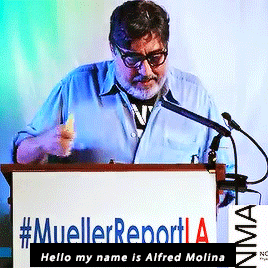
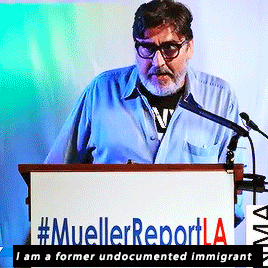
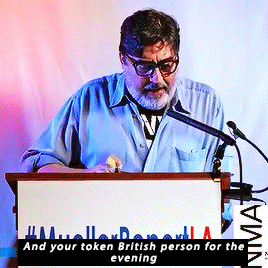
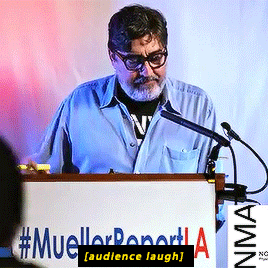
Alfred Molina reading the Mueller report at the Odyssey Theatre Ensemble, July 23, 2019.
#Alfred Molina#alfredmolina#mueller report#Donald Trump#gifs#gifs set#fun#i bet he said yesss!!! when the joke landed#my silly goose
67 notes
·
View notes
Text
The Justice Department must make public an internal legal memo commissioned by then-Attorney General William Barr in 2019 to analyze whether he should charge then-President Donald Trump with obstruction related to the Russia investigation, a federal appeals court ruled on Friday.
The ruling from the DC Circuit Court of Appeals comes in a case brought by a government watchdog group that is seeking to get the unredacted version of the memo. The DOJ argued some redacted portions should be shielded from public view.
But the federal appeals court didn't buy that argument, finding that Barr never seriously considered charging Trump with obstructing the Mueller investigation -- saying in the ruling that the memo Barr ordered up was an "academic exercise" and a "thought experiment."
Special counsel Robert Mueller's investigation found several instances where Trump's actions while President could meet the requirements for an obstruction of justice charge, but Mueller left the decision to Barr.
Barr then told Congress he was "consulting" with top DOJ officials on whether there was enough evidence to show Trump committed obstruction. But that was misleading, the courts have found and the Justice Department has since acknowledged.
Barr had already decided the sitting President would not be charged with a crime, Chief Judge Sri Srinavasan of the DC Circuit wrote in the new opinion.
The DC Circuit likened the Trump charging analysis that Barr requested from the DOJ's Office of Legal Counsel and others to him asking for a departmental position on whether the late President Richard Nixon broke the law during Watergate -- an imaginary request that could be made "because [the Attorney General] had simply been curious," the appeals court wrote.
The court ultimately ruled on the side of the group Citizens for Responsibility and Ethics in Washington after the DOJ tried to argue its redactions were still valid because they protected legal deliberations. Those legal deliberations didn't exist in this circumstance, the court decided, agreeing with lower court Judge Amy Berman Jackson.
#us politics#news#donald trump#trump administration#cnn#2022#william barr#bill barr#russia investigation#DC Circuit Court of Appeals#robert mueller#mueller report#department of justice#obstruction of justice#Chief Judge Sri Srinavasan#Office of Legal Counsel#Citizens for Responsibility and Ethics in Washington#Judge Amy Berman Jackson
7 notes
·
View notes
Text
April 14, 2020
“[w]hen somebody’s the president of the United States, the authority is total.”
#democracy#2020 election#peaceful transfer of power#attorney general#mueller report#seditious conspiracy#felony#impeached#trump university#trumprapist#P01135809
0 notes
Text
A Case Of Too Little, Too Late
To find your conscience a day late is better than never finding it, but imagine the good you could have done if you had found it a few days sooner? My grandmother used to have a saying for such that “It’s like closing the barn door after the cow already got out.”
William Barr was the U.S. Attorney General from February 19th, 2019 to December 23rd, 2020 – 673 days. During that time he was…

View On WordPress
#former AG William Barr#Hillary Clinton#January 6th attempted coup#Mueller report#Trump indictment#U.S. Department of Justice
0 notes
Text
Tiffany Trump Charged Full Venue Price For Mar-A-Lago Wedding
Tiffany Trump Charged Full Venue Price For Mar-A-Lago Wedding
PALM BEACH, FL—Shaking her head in anger and disbelief as she scanned the invoice, Tiffany Trump reportedly received a bill from the Mar-a-Lago Club Tuesday charging her the full venue price for her wedding. “$95,000 for catering? Are you fucking kidding me?” said the 29-year-old Trump, who noted that the wedding cake looked nothing like the one she ordered and that the food “hadn’t even been…
View On WordPress
#American people of German descent#Businesspeople#Climate change skepticism and denial#Donald Trump#Mar-a-Lago#melania trump#Mueller Report#Right-wing populism in the United States#The Onion#tiffany trump#united states
1 note
·
View note
Text
Vorspiel zu einem schmutzigen Wahlkampf: Trump und das FBI
Vorspiel zu einem schmutzigen Wahlkampf: Trump und das FBI
Das FBI veröffentlicht heute ein Dokument, das die Gründe für die Hausdurchsuchung bei Trump offenlegen soll. Viel Aufklärung ist nicht zu erwarten. Weite Teile werden geschwärzt sein. Die Vorgänge sind eher als Vorspiel eines schmutzigen Wahlkampfes einzuordnen.
Das Verhältnis zwischen Donald Trump und dem US-amerikanischen Inlandsdienst FBI ist seit Jahren gespannt. Der Verdacht steht im Raum,…

View On WordPress
0 notes

